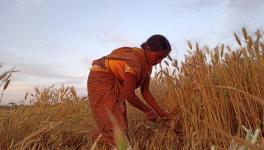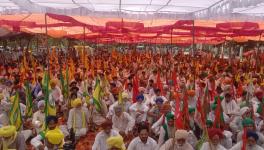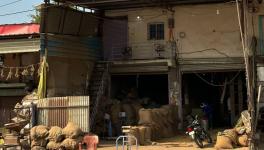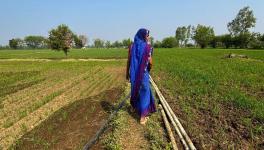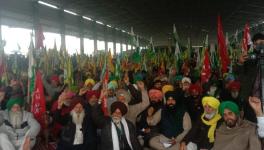Farmers Fight for Bharat that is India
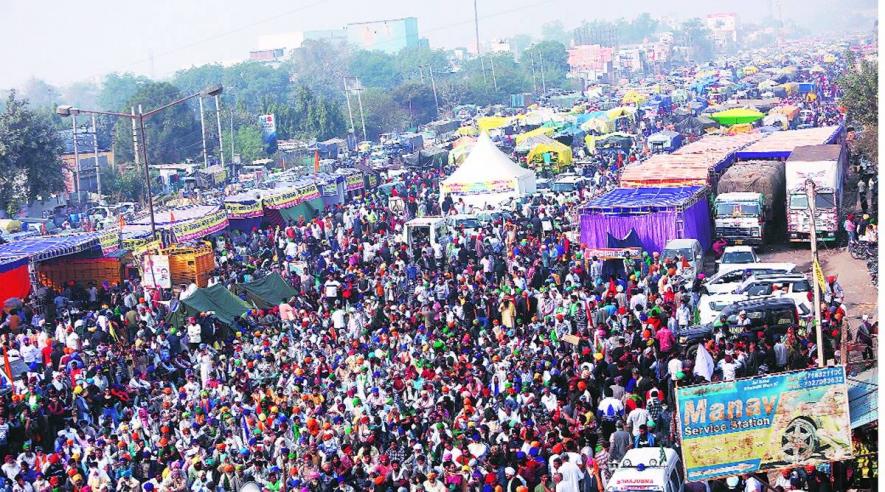
Image Courtesy: The Indian Express
The fate of India and our food system rests with a peaceful army of farmers that is besieging Delhi. They have blocked borders, and are constantly sending envoys to the Shah of India for justice. As another round of talks have failed, farmers have declared a Bharat Band on 8 December. In the meantime, fears have gripped citizens as food and vegetables prices are shooting up and hoarders (no longer illegal post the farm bills) are celebrating an early Christmas.
Heavily-militarised police forces with foreign-bought AK-47, tear gas shells, German MP5s and riot gear are standing by, anxious to lathi-charge their own brethren. They have set up unnecessary road blocks all around the city, delaying traffic within Delhi. Our annadaata confront a water cannon and tear gas-laced winter chill. Betraying all notions of self-preservation, still India’s farmers stand united against their oppressors and the “black farm bills”. They demand only what is fair—a minimum price for their labour. Having been bitten once, they stand united to resist a neo-Company Raj.
BigAg lobbyists—the Mir Jafars who live in warm rooms with iPhones and fragile hands are reassuring the public through the corporate media. They are doing their masters’ bidding; defaming farmers on primetime, supplanting the truth with BigAg propaganda. The government is using an old strategy, deploying new-age “robber barons” to divide and rule farmers’ unions. Lately, the government called only 32 Punjab-based unions to talks, leaving others outside the negotiating room. Howard Zinn sniggers at the goings-on, for despite his work exposing the American robber barons and their modus operandi, the land of Gandhi is prepped and ready to be slaughtered by them.
The government may now play favourites, choose one union leader over the other and make the discourse turbid, buying time to incriminate all dissenting leaders with heavy-handed charges, abuse the privacy of protesting farmers by deploying surveillance—drones, mobile taps, and so on. The final stage may be the government bringing in “strike-breakers” or pro-establishment farmers’ groups and corporate farmers to sign an accord with it and “end” the matter. In case things get out of hand, one should not be surprised to hear the media drum up rumours of the resurgence of the “Khalistan movement” in Punjab and how the farmer unions are sympathetic to them.
To return to the deadlock: the farmers want MSP for their crops and the government says it cannot promise that. One does not expect the government to budge, for they are powerless: if they introduce MSP as a legal right, the three farm bills will be overturned. Indian markets will not be open to BigAg any more. Additionally, how will the government implement the MSP at the rural market or “baniya” level is a big question. If since its inception in the 1960s MSP has only reached a small percentage of farmers, what is different in 2020? Hence the government can never make MSP a legal right. They may try to trick the farmers with the “grading” jargon, state that the MSP will only be given for graded produce, but by accepting this “deal” Indian farmers will be destroyed the same way farmers in the United States of America were.
Barring Punjab and Haryana, MSP is already a distant dream for farmers. Even if some states make MSP a legal right, corporations have the choice of buying in bulk from states that do not make it a legal right. What happens to farmers in that case?
Farm life is tough. Imagine waking up in a two-room mud house at 5 am and running to work in the fields, and spending every evening weeding, ploughing and seeding, then carefully guarding your crops for the season, while debts and bills pile up on the family. Then when the harvest arrives, it brings more losses. This is the small and marginal farmers’ life. They struggle every day to make ends meet, so they are extremely watchful because their lives depends on agriculture. When they cannot earn enough, they consume pesticide and die. More than 3,00,000 farmers have committed suicide due to debt in over a decade. So, farmers are not “misled” or ill-informed, nor are they overcome by lassitude. City people flippantly discount them as “rustic”, mock their intelligence and yet dare not face their courage. And policy makers cannot answer their questions.
Up against a techno-militaristic juggernaut, one feels that the farmers and their leaders know their vulnerabilities—talks are futile. They know this movement is their final sacrifice to awaken the conscience of the nation. They have come to Delhi not with a begging bowl but carrying a heavy cross with a smile and their crown of thorns. Guided by the gurus, they come to Delhi to expose the corruption and degeneracy that ensnares us. No doubt, the farmers know they will be misjudged and hunted, but what can they do but rebel for the sake of their children, their ancestral lands, for civilisation itself?
Many of us know the farmers are right and their protests will not go in vain; for they are seeding hope of change within everybody. That is why they ought to rebel peacefully and more vociferously every day. The violence of the state shall be their reward and salvation. Every pain they endure shall be like penance for those who are not protests. Sooner or later, everybody will see the truth, boycott BigAg and rally behind the farmers. If Indian civilisation has to survive, it needs to treat farmers fairly. Else, we are sowing a new corporate disease deep within and the resultant greed and poverty can destroy India.
India’s farms and villages are India. If the government does not course-correct, each roti will be mottled with the blood of farmers. In the words of Gandhi, “Strength does not come from physical capacity. It comes from an indomitable will”. India’s farmers are possessed by this will and the force of their truth shall prevail. Those who wear the uniform and those who patrol our streets are also farmer’s children, and blood is much thicker than water. By stealing from farmers what is their due we are challenging the soul of civilisation and India, that is Bharat, is fighting back.
The author writes on agriculture and related issues. The views are personal.
Get the latest reports & analysis with people's perspective on Protests, movements & deep analytical videos, discussions of the current affairs in your Telegram app. Subscribe to NewsClick's Telegram channel & get Real-Time updates on stories, as they get published on our website.














